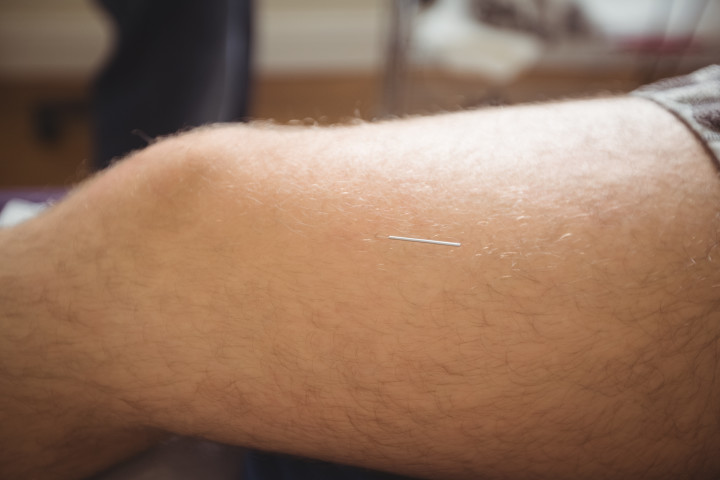Acupuncture is a holistic modality that addresses emotional, spiritual, physical, and mental health. Acupuncture is recognized by the National Institute of Health (NIH) and World Health Organization (WHO) for treating numerous conditions. An ancient Chinese medicine used for thousands of years, acupuncture is based on the meridian system. According to traditional Chinese medicine, meridians are pathways in the body where life energy or “qi” flows. There are 12 meridians. Most are named for the organ in the body that they are associated with (ex. heart meridian, lung meridian, liver meridian).
Acupuncture is the practice of using very fine, sterilized needles — the thickness of a hair — at pressure points to stimulate parts of the nervous system. The needles are inserted into specific places to unblock a blockage, move blood flow, and promote overall balance in the body. Acupuncture is sometimes used in holistic mental health treatment and addiction treatment programs.
Common conditions acupuncture therapy has been used to treat include:
- Drug and alcohol withdrawal symptoms
- Depression and anxiety symptoms
- Chronic pain
- Headaches and migraines
- Menstrual cramps
- Labor pain
- Low back pain
- Dental pain
- Infertility
- Osteoarthritis
- Insomnia
- Muscle aches
- Nausea
- Asthma
- Fibromyalgia
How Does Acupuncture Help Addiction?
Research on acupuncture is still in its infancy. Using acupuncture for addiction began in the early 1970s in China when a physician observed that acupuncture provided a reduction in withdrawal symptoms for people who abused opiates. Acupuncturists found that inserting and manipulating meridian points could possibly help reduce cortisol and balance dopamine levels to decrease withdrawal symptoms and cravings that come from drug and alcohol detox.
NADA or AcuDetox is a specific acupuncture protocol developed to ease alcohol and drug detox symptoms. Developed 40 years ago by the National Acupuncture Detoxification Association, research suggests AcuDetox is an effective addiction treatment as a relapse prevention tool and a complement to traditional approaches like cognitive behavioral therapy. It’s been shown to:
- Ease drug and alcohol withdrawal symptoms.
- Increase chances of completing addiction treatment programs.
- Increase chances of staying sober after addiction treatment.
- Improve quality of life.
- Increase energy.
Holistic addiction recovery centers often use AcuDetox during drug and alcohol detox and throughout treatment. Acupuncture for addiction works on the central nervous system to reduce the severity of common alcohol and drug withdrawal symptoms like:
- Cravings
- Insomnia
- Muscle aches and cramps
- Anxiety
- Depression
- Digestive issues
Acupuncture for addiction can evoke a better sense of calm and well-being. The less substance abuse withdrawal symptoms you’re experiencing, the better you’re able to focus on treatment and getting better. Less withdrawal symptoms may also prevent relapse. People who try to withdraw from drugs and alcohol on their own without the help of professionals are likely to relapse because they want to stop the physical or psychological withdrawal symptoms that can come with it.
What Is an Acupuncture For Addiction Session Like?
AcuDetox draws on auricular acupuncture protocols targeted to addictions, trauma, and mental health disorders. The actual acupuncture session and experience is much like a regular acupuncture session. An acupuncturist inserts very small, sterile needles into your skin and then you sit still and quietly for at least 20-30 minutes.
NADA acupuncture targets five areas on the ear believed to be associated with substance abuse. This type of acupuncture is commonly performed in a group and sessions last from 30-45 minutes. Participants report feeling energized after AcuDetox, but also calm and relaxed.
Acupuncture for Co-Occurring Disorders Mental health disorders sometimes co-occur with drug and alcohol addiction. People with anxiety, depression, and other conditions may abuse drugs and alcohol to cope with symptoms of mental health disorders. Effective substance abuse treatment must address drug and alcohol abuse as well as underlying issues like mental health disorders.
Acupuncture can be a complement to traditional mental health disorder treatment. Some research shows acupuncture as a promising depression treatment when combined with antidepressants and therapy. It can help increase quality of life and social-emotional health. Studies also suggest acupuncture can be an effective anxiety treatment.
Dual diagnosis treatment that includes acupuncture can help with the stress, anxiety, and depression that are often associated with alcohol and drug addiction.
Get Holistic Addiction Treatment at Footprints
Footprints to Recovery takes a holistic approach to alcohol and drug addiction treatment. We combine evidence-based therapies like individual, group, and family therapy with alternative approaches so that you can begin repairing the physical, mental, and spiritual wounds of addiction. We have acupuncture specialists trained in the NADA approach, and we offer a variety of other alternative therapies. Depending on the Footprints to Recovery location, alternative addiction therapy options include approaches such as yoga, drum circle, psychodrama, nutrition services, EMDR, and art therapy.
Our alcohol and drug rehabs offer a full continuum of care that includes:
- Medical detox for alcohol and drug abuse
- Residential treatment
- Partial hospitalization program (PHP)
- Intensive outpatient treatment
- Outpatient program
- Sober living residences
If you or a loved one is struggling with drug or alcohol abuse, call us for a free, confidential consultation. We can help.
References
- https://pubmed.ncbi.nlm.nih.gov/18618246/
- https://acudetox.com/nada-protocol/
- https://www.ncbi.nlm.nih.gov/pmc/articles/PMC5485467/
- https://acudetox.com/evidence-for-acu-detox-by-nityamo-lian-dom-mph/
- https://www.phillymag.com/be-well-philly/2011/03/16/what-the-heck-is-acudetox/
- https://www.ncbi.nlm.nih.gov/pmc/articles/PMC6722678/
- https://www.ncbi.nlm.nih.gov/pmc/articles/PMC6722678/
- https://www.sciencedirect.com/science/article/pii/S0254627216300218
- https://annals-general-psychiatry.biomedcentral.com/articles/10.1186/s12991-021-00327-5






